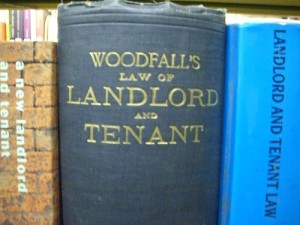Posted by Teresa on April 3, 2012 under Fair Housing Act | 
 The Fair Housing Act (FHA) requires owners of rental properties to make reasonable exceptions in policies and operations to provide equal housing opportunities to persons with disabilities. If you don’t normally allow pets, you may be required to make an exception to accommodate a service or companion animal for any tenants with disabilities.
The Fair Housing Act (FHA) requires owners of rental properties to make reasonable exceptions in policies and operations to provide equal housing opportunities to persons with disabilities. If you don’t normally allow pets, you may be required to make an exception to accommodate a service or companion animal for any tenants with disabilities.
But what if the companion animal poses a threat to your other tenants—or to you? Do you have to accommodate an aggressive animal under the FHA?
Probably not. While you must make reasonable accommodations for tenants with disabilities, they have responsibilities, too. If you request it, tenants with disabilities must provide documentation that the service animal is required from a physician or other healthcare professional. However, as a landlord, you are within your rights to require that every service animal be vaccinated, trained and non-threatening to other residents and the public.
The FHA does not protect tenants who create a nuisance or direct threat to the health and safety of others. If a tenant’s aggressive dog creates a direct threat, then you could be justified in requiring the tenant to take corrective action or remove it.
However, taking action based on speculation about a dog’s breed or appearance is not advisable. Rather, make an objective evaluation based on observation and available data. Does the dog have a history of aggression? Has it ever bitten or harmed anyone? Does it bark excessively? Could putting a muzzle on the dog when it’s outside the rental unit solve the problem?
If you have a tenant with disabilities who has a companion or service animal that is noisy, aggressive or a nuisance, keep the communication open and look for ways to come to a solution.
Posted by Teresa on July 8, 2011 under Eviction, Lease and Rental Agreements, Rents and Deposits | 
 Whether you accept actual checks or electronic rent payments from your tenants, you may face a time when the tenant lacks funds to cover their payment—and your account is hit with a fee. Bounced checks cause loss of time and productivity, and landlords should not allow tenants to treat a returned rent check as anything less than the serious situation it is.
Whether you accept actual checks or electronic rent payments from your tenants, you may face a time when the tenant lacks funds to cover their payment—and your account is hit with a fee. Bounced checks cause loss of time and productivity, and landlords should not allow tenants to treat a returned rent check as anything less than the serious situation it is.
How do you handle bounced checks from your tenants?
Many landlords we know demand immediate full payment from the tenant for the rent, any applicable late fees, and a separate handling fee. The handling fee should cover both your bank’s returned check charge and your administrative time. If the full rent payment comes in after late fees have been assessed, be sure to add them to the total due.
Check your local and state laws regarding the amount of late and returned check fees you can charge. You may be able to charge a tenant penalties and interest; or you may be limited to a flat fee.
In addition, check local and state ordinances or with a landlord/tenant attorney regarding whether late and returned check fees must be spelled out in lease agreements. In some states and localities, fees must be clearly stated in the lease or the landlord may not charge them. In others, whether or not the lease includes the fees has no bearing.
Of course, including all applicable terms and fees in the lease is always a good idea. If your lease clearly spells out the consequences for bounced checks, including late fees, repayment requirements and time limits before eviction proceedings begin, your tenants should have no questions or surprises if and when they do write a rent check without having sufficient funds to cover it.
Protect your rental property and assets through tenant background checks. Proper tenant screening will ensure you are leasing to the best possible tenants.
Posted by Teresa on May 28, 2011 under Eviction, Lease and Rental Agreements | 
 The Chicago Housing Authority is proposing a new rule that all adult tenants will need to be drug tested, and if they test positive, eviction proceedings will begin. While some private landlords would welcome the opportunity to test and then evict illegal drug users, more have to deal with tenants who smoke pot.
The Chicago Housing Authority is proposing a new rule that all adult tenants will need to be drug tested, and if they test positive, eviction proceedings will begin. While some private landlords would welcome the opportunity to test and then evict illegal drug users, more have to deal with tenants who smoke pot.
If you’ve noticed the distinctive smell of marijuana wafting out of your rental properties, how did you handle it? Some might think that smoking pot is as harmless as drinking a beer, but it’s still illegal. And if you’re ignoring a tenant’s drug use, you could be putting your business at risk.
Did you know that illegal drug use by tenants in your rental units could subject you to related property damage and personal injury suffered by other tenants or the public? Is it worth it to you?
Your best move as a landlord is to include a clause in your lease agreement that tenants agree to not violate any applicable laws, including the possession, use or sale of illegal drugs. If and when a tenant violates the lease by choosing to smoke marijuana, you have the grounds to evict.
Some landlords might think evicting over pot smoking is overkill. But allowing it can leave you open to litigation; the potential for harm is just too great. Besides, if you can smell marijuana, your other tenants probably can, too. What message are you sending if you fail to enforce the law, as well as the terms of your lease agreement?
Posted by Teresa on May 11, 2011 under Landlord Tips | 
 Landlords and property managers have to deal with tenant complaints. It’s just a fact of life when you’re in the rental property business. Whether you’re interacting with a tenant who complains frequently or rarely, it’s important to properly track the complaint and your response—you never know when you’ll need the facts of the matter to protect yourself and your assets.
Landlords and property managers have to deal with tenant complaints. It’s just a fact of life when you’re in the rental property business. Whether you’re interacting with a tenant who complains frequently or rarely, it’s important to properly track the complaint and your response—you never know when you’ll need the facts of the matter to protect yourself and your assets.
Establish Good Communication With Every Tenant
Encourage tenants to come to you with complaints, rather than letting them go or complaining to other tenants. You can foster this by demonstrating good listening and communication skills. Get to know your tenants as people, listen for clues about what matters to them, and give them the respect they deserve. When tenants trust you, they will be more likely to approach you with a problem.
Establish a Tenant Complaint Procedure
Creating an official form demonstrates to the tenant that you are taking their complaint seriously. It also allows you to keep a record of the situation. You can record details of how you handled the complaint, what repairs or remedies were performed, and you can even make a note of when to follow up with the tenant to be sure the complaint is resolved to their satisfaction. This becomes especially important in cases where a tenant withholds rent for non-satisfaction of complaints.
Fixing broken windows or door locks, replacing noisy ceiling fans and other mechanical problems can usually be resolved to everyone’s satisfaction. When tenants complain about their neighbor’s bad parking habits or noisy parties, you have a more delicate situation on you hands. If your lease agreement includes a list of “house rules” such as quiet time or established parking areas, then you’re covered. You simply speak to the tenant who is breaking the rule and point out that expectations were clearly established. If the problem continues, written warnings and even eviction are your next steps.
It may be difficult–if not impossible–to keep 100% of your tenants 100% happy. But the goal is to keep good tenants in your properties and to keep everyone as safe and as happy as you can. Resolving issues promptly goes a long way toward that goal.
Posted by Teresa on January 4, 2011 under Landlord Tips, Tenant Screening & Background Checks | 
 We recently heard from Jason, a fairly new landlord, regarding a common problem: a tenant who calls the police—a lot. “I did my due diligence and ran a tenant background check and criminal screening on her, and she came through with flying colors. Unfortunately, I can’t say the same about some of her former friends,” Jason said.
We recently heard from Jason, a fairly new landlord, regarding a common problem: a tenant who calls the police—a lot. “I did my due diligence and ran a tenant background check and criminal screening on her, and she came through with flying colors. Unfortunately, I can’t say the same about some of her former friends,” Jason said.
After the tenant moved in, her former boyfriend started showing up, uninvited. She felt harassed and seemed to be unable to get him to leave on her own. “She calls the cops at least once a week,” said Jason. “It looks bad to the neighborhood and it concerns my other tenants. I’m thinking about evicting her.”
Jason was rightly concerned that he could be in violation of the law if he proceeded with eviction. He planned to contact his attorney to be sure. But what should a landlord do when an otherwise perfect tenant makes his or her personal problems a larger issue? If the tenant has done nothing wrong, is it fair to force her out?
One landlord said the best course is to encourage the tenant to seek a restraining order, or to refer the tenant to a domestic violence prevention center. Another mentioned that if the tenant is not an innocent victim, but rather calls the police for minor issues that the landlord or property manager should be handling, it could be more of a nuisance issue. In this case, eviction could be the proper recourse to allow other tenants quiet enjoyment of their homes.
Landlords cannot generally evict tenants when they are exercising their rights. And, it is certainly up to the management to control tenant actions when they affect others. Most landlords we talked to about Jason’s case indicated they would get involved in the situation in order to prevent a possible escalation of harassment. Obviously, confronting the ex-boyfriend is not a good idea, but helping the tenant seek a restraining order is much better than doing nothing. Evicting her would only compound the problem.
When you are a rental property owner, it is in your best interest and that of your tenants to provide a safe environment. This tenant’s calls to the police could be a wake-up call for the landlord to get involved. Remember, when it comes to bullies like this tenant’s ex-boyfriend, stay safe and let the police do their jobs!
Posted by Teresa on September 21, 2010 under Landlord Tips, Tenant Screening & Background Checks | 
 Sizing up tenants is a tricky business. Legally, a landlord cannot discriminate against potential tenants based on gender, age, race, family status, religion, disability or country of origin. And experienced landlords know that you can never judge a book by its cover. That flashy car and expensive jewelry doesn’t guarantee a tenant that will pay the rent on time. Conversely, a beater car and sloppy appearance might not be ideal, but if they can pay the rent, should we care about a wrinkled shirt?
Sizing up tenants is a tricky business. Legally, a landlord cannot discriminate against potential tenants based on gender, age, race, family status, religion, disability or country of origin. And experienced landlords know that you can never judge a book by its cover. That flashy car and expensive jewelry doesn’t guarantee a tenant that will pay the rent on time. Conversely, a beater car and sloppy appearance might not be ideal, but if they can pay the rent, should we care about a wrinkled shirt?
While keeping an open mind during the tenant application process is a good idea, you still want to start the screening process with your very first contact.
Here are 4 warning signs that a potential tenant could cause you problems:
- Your potential tenant cannot pay the security deposit. If they want to pay in installments, or as soon as they get paid next week, or when they get their security deposit back on their current place, you might need to get used to hearing such excuses.
- They are a little too “salesy.” Excitement over finding a great apartment or rental house is great—you want your tenants to like your rental property. But major flattery of you, your outfit, your hairdo or the property should be a red flag. So is selling him or herself too hard. You could have a con artist on your hands!
- A potential tenant starts asking about trading services for rent. There are plenty of landlords who allow tenants to repair and maintain their building or cut the grass in exchange for rent. But it can lead to problems. If you’re not yet at the lease stage and you’re hearing offers of bartering for rent, consider yourself lucky and move on.
- The lease application is not filled out completely. Conveniently forgetting the phone numbers of a current landlord, boss, or personal references is a bad sign. Leaving blanks indicates that your potential tenant might not want you to have that information.
Follow up your gut-check on every tenant with a thorough background and credit screening. If all comes back clean, check with references and employers to give yourself a complete picture of your tenant—before the lease is signed!
Posted by Teresa on June 8, 2010 under Eviction, Tenant Screening & Background Checks | 
 Elaine is a responsible, no-nonsense landlord. Her leases are clear and thorough, and her tenants generally live by her rules. Every now and then, however, Elaine signs a lease with a tenant who unexpectedly starts causing trouble—despite her checking the tenant’s rental history, criminal background, and credit.
Elaine is a responsible, no-nonsense landlord. Her leases are clear and thorough, and her tenants generally live by her rules. Every now and then, however, Elaine signs a lease with a tenant who unexpectedly starts causing trouble—despite her checking the tenant’s rental history, criminal background, and credit.
This time it’s a young woman who is simply too loud. She plays her TV at top volume, listens to bass-busting music late at night, and has way too many parties with her also-loud friends.
Elaine has reminded the young tenant about her rules on disturbing the peace. She’s asked her to discontinue the behavior. And now, other tenants are complaining. Elaine is ready to issue a Three-Day Notice to Quit. Is that her best option?
According to our sources, no. This non-conditional notice is generally used when whatever is happening to breach the lease cannot be corrected. Examples include illegal behavior like selling drugs, irreparable damage to the property, or subleasing the property without permission. The notice tells the tenant that if they are not out in three days, eviction proceedings will begin.
In this case, Elaine’s tenant could still correct her problem—just by quitting the loud parties and turning down her stereo equipment. Therefore, a Three-Day Notice to Perform Covenant or Quit is the better recourse. It must specifically state the behavior that breaches the lease so the tenant can correct it.
Then if the problem continues over the three-day period, Elaine can start eviction proceedings. But what if the tenant quiets down for three days, and turns up the volume again? Hopefully, the threat of eviction is enough to inspire behavior modification in this tenant. If not, another Three-Day Notice to Perform Covenant can be issued. After a few of these, it might be time for the Three Day Notice to Quit!
Legal disclaimer:
The contents of this article are intended for general information purposes only, and should not be relied upon as a substitute for obtaining legal advice applicable to your situation. Always consult your legal advisor for your particular situation.
Posted by Teresa on March 18, 2009 under Eviction, Landlord Tenant Lawsuits | 

Courtesy of www.flickr.com/umjandoan
Eviction: the word itself sounds unpleasant, and it is—on both sides. Does any landlord begin the eviction process against a tenant unless it is absolutely necessary? It’s not likely that anyone actually enjoys the legalities, paperwork, court orders and stress that accompany this process.
The best way to prevent having to evict tenants is to do the work required up front to attract and retain the best tenants. A few examples are:
1. Keep your property in the best possible condition;
2. Keep communication open with your tenants;
3. Screen tenants prior to signing the rental agreement;
4. Put everything in writing.
Even when all seems to be going well, you could still experience a situation that cannot be tolerated; and eviction is the eventual result. Knowing what to do in this case can make it easier.
Eviction laws vary by state and even by locality; it is vital to follow them precisely. You may decide to consult an attorney or eviction service to assist you; if so, the web is a great resource to find these specialists.
There are basic rules to evict problem tenants, no matter where you live. First, a legal reason, such as violating the lease agreement, is required. Second, you must give the tenant notice. Each state has exacting procedures that define “proper notice.” Keep in mind that in some localities, you may not follow through on the eviction if you accept rent payments after giving notice. Third, you will have a legal proceeding before a judge. If the judge’s rule calls for eviction, there will be a notice of eviction from the court.
Now, the court may side with the tenant; if you decide to appeal the decision, be prepared for another lengthy and costly procedure. You will likely need legal representation for the appeals process. And, the tenants can appeal, as well—so a first-round victory doesn’t mean you’re completely off the hook.
Preparation is key: a solid rental agreement, along with evidence (such as photographs and communication logs) will be your best tools when facing the eviction process. It’s easier to stay organized from the beginning than to try to catch up when you’re facing a court date!
Next Post: Becoming a Landlord
Posted by Teresa on March 11, 2009 under Landlord Tips, Tenant Screening & Background Checks | 

Stessed Out Over Problem Tenants?
Every landlord defines “problem tenants” differently, but all can agree they are just not easy to deal with. You might be considered lucky if your problem tenant is just late with the rent or is loud and disruptive at 3 a.m. While some bend the rules, others break your property, causing costly damages. And in extreme cases, tenants threaten harm to others or engage in illegal activity. Problem tenants cause much more than headaches for their landlords. What are your options in dealing with them?
Laws vary by state and even locality, so be sure to check with legal resources before proceeding to any action. Tenants have rights, too. You do not want to be sued for taking illegal action against a problem tenant. If you intend to end the tenancy for a rules violation, you must give the tenant written notice, with time for them to correct the problem. If a tenant is late on rent, you send a notice giving them a number of days to pay or they must vacate the premises. For recurring problems such as late payment, or major damages, you would send an unconditional notice to move, with no time to correct the issue.
When you have exhausted other options, there is often no choice other than to evict. Consistent late rent, severe property damage, illegal activity or non-payment of rent are good reasons to proceed to eviction.
It’s a good practice to communicate regularly with tenants, and to carefully document all communication. If you are claiming damages or lease violations, you must have proof if you end up in court, so make notes, send correspondence by certified mail when necessary, and take photos of all damages.
The best defense against problem tenantsis to prevent them from moving into your property in the first place. Prescreening tenants with reference, background and credit checks is not 100% foolproof, but it’s a good practice to establish. While there are no guarantees, and even the most cautious landlords have their share of bad tenants, prescreening will definitely help you avoid them.
Next Post: Illegal Retaliation
 The Fair Housing Act (FHA) requires owners of rental properties to make reasonable exceptions in policies and operations to provide equal housing opportunities to persons with disabilities. If you don’t normally allow pets, you may be required to make an exception to accommodate a service or companion animal for any tenants with disabilities.
The Fair Housing Act (FHA) requires owners of rental properties to make reasonable exceptions in policies and operations to provide equal housing opportunities to persons with disabilities. If you don’t normally allow pets, you may be required to make an exception to accommodate a service or companion animal for any tenants with disabilities.







